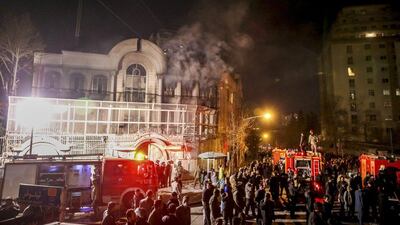RIYADH // Iranian protesters stormed the Saudi embassy in Tehran early on Sunday morning as Iran reacted with fury to Saudi Arabia’s execution of a prominent Shiite religious leader.
Demonstrators who had gathered at the embassy gates to protest at Sheikh Nimr Al Nimr’s execution broke into the embassy and started fires before being cleared away by the police, Iran’s ISNA news agency reported.
Pictures were tweeted that showed parts of the interior on fire and smashed furniture inside one office.
Shortly afterwards, Iran’s Foreign Ministry issued a statement calling for calm and urging protesters to respect the diplomatic premises, the Entekhab news website reported.
Iran’s Revolutionary Guards had promised “harsh revenge” against the Saudi royal family for Saturday’s execution of Nimr, considered a terrorist by Riyadh but hailed in Iran as a champion of the rights of Saudi Arabia’s Shiite minority.
Although most of the 47 men killed in the kingdom’s biggest mass execution for decades were Sunnis convicted of Al Qaeda attacks in Saudi Arabia a decade ago, it was Nimr and three other Shiites, all accused of involvement in shooting police, who attracted most attention in the region and beyond.
The move appeared to end any hopes that the appearance of a common enemy in the form of ISIL would produce some rapprochement between the countries, who back opposing sides in wars currently raging in Syria and Yemen.
The website of Iran’s Supreme Leader, Ayatollah Ali Khamenei, carried a picture of a Saudi executioner next to notorious ISIL executioner ‘Jihadi John’, with the caption “Any differences?”, and Iran’s powerful Revolutionary Guards said “harsh revenge” would topple “this pro-terrorist, anti-Islamic regime”.
“The Saudi government supports terrorist movements and extremists, but confronts domestic critics with oppression and execution,” the Iranian foreign ministry spokesman Hossein Jaber Ansari said.
It will “pay a high price for following these policies”, he warned.
Saudi Arabia summoned the Iranian ambassador, only to see its embassy stormed soon afterwards.
In Iraq, whose Shiite-led government is close to Iran, prominent religious and political figures demanded that ties with Riyadh be severed, calling into question Saudi attempts to forge a regional alliance against ISIL, which controls swathes of Iraq and Syria.
Despite the regional focus on Nimr, the executions seemed mostly aimed at discouraging extremism in Saudi Arabia, where dozens have died in the past year in attacks by militants.
The US State Department said Nimr’s execution “risks exacerbating sectarian tensions at a time when they urgently need to be reduced”. The sentiment was echoed almost verbatim by EU foreign policy chief Federica Mogherini and an official at the German foreign ministry.
The State Department also urged the Saudi government to “respect and protect human rights, and to ensure fair and transparent judicial proceedings in all cases”, as well as to permit peaceful expression of dissent and work with all community leaders to defuse tensions.
The simultaneous execution of 47 people — 45 Saudis, one Egyptian and a man from Chad — was the biggest mass execution for security offences in Saudi Arabia since the 1980 killing of 63 militants who seized Mecca’s Grand Mosque in 1979.
The four Shiites had been convicted of involvement in shootings and petrol bomb attacks that killed several police during anti-government protests from 2011-13, in which more than 20 Shiites were also shot dead by the authorities.
Family members of the executed Shiites have vigorously denied they were involved in attacks and said they were only peaceful protesters against sectarian discrimination.
* Reuters with Agence France-Presse

